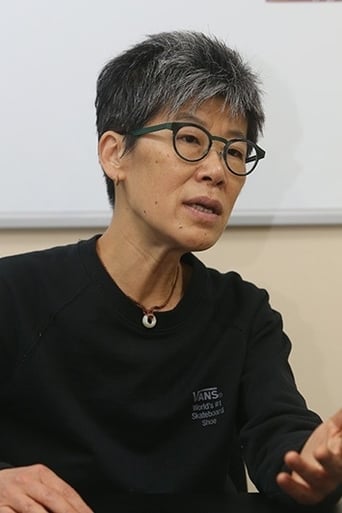lyx-1
I have been disappointed by some of the more recent Korean films that promise to lead the audience into deep dark psychological realms but deliver only rather trite and confusing plots even if the cinematography and acting were stunning.After being almost overwhelmed towards the conclusion of this animation, I believe that the spirit of Korean cinematic honesty, confrontation, complex psychegeography lives on in works like King of Pigs.I won't go into the story - the plot is straightforward enough: bullying, high school hell, the sickness of a society based on hierarchy and class, corruption of the system...but the delivery of the narrative gets under your skin in completely original, unexpected ways.The end twist is utter believable, and delivers a double whammy, so stay glued to your seat.I can't understand some of the low ratings, though many might find this very difficult to watch due to the horrors depicted. It wasn't an easy film to sit through, but it is worth every effort to do so.
tieman64
"Americans remind me of survivors of domestic abuse. There is always the hope that this is the very, very, very last time one gets one's ribs re-broken." - Inga Muscio Grotesque and violent, Yeun Sang-Ho's "The King of Pigs" is a low budget animated feature from South Korea. Like a demented take on Orwell's "Animal Farm", or Golding's "Lord of the Flies" (to which its title alludes), the film watches as a gang of privileged kids (nicknamed the "dogs") repeatedly brutalise and bully a school's lower class students (nicknamed the "pigs").Orwell's tale saw one pig rise and destroy his oppressors. In "The King of Pigs" we see a poverty stricken student, Chul Kim, stand up to his bullying school-mates. Rather than a romantic hero, though, Chul is portrayed as a violent psychopath. "We must become more evil than they are," Chul explains, internalising the hate directed at him and re-directing it, tenfold, at those who brutalise him.Virtually everyone in Yeun Sang-Ho's tale is understood as being either a victim or victimiser. Workers and employers, the rich and the poor, businessmen and prostitutes, students and teachers, men and women, bullies and classmates, humans and animals...they're all trapped in Yeun Sang-Ho's very rigid social hierarchy. Even those who seem to escape poverty ultimately find themselves back in financial debt, beholden to others. Capitalism as a form of psychic and literal violence, the film paints a world bound by the laws of competition, predation and psychopathy. "Money only follows the rich," Chul says, "you need to be a monster if you don't want to keep living like a loser." Whilst Yeun Sang-Ho's film portrays a very real, contemporary problem in South Korea – parental/social pressures and limited job vacancies have led to a rise in local bullying – all his films are works of social critique which portray a more global situation. In "Pigs" we thus see an expansive, social hierarchy based on wealth; the ruling "dogs" and the subservient "pigs". This regime, which infects all social institutions, is enforced by the oldest all the way down to the youngest. Through them, violence is perpetrated against those lower in the social pecking order: the rich against the poor, men against women and humans against animals, who represent the lowest rung on the ladder and the most vulnerable."The King of Pigs" is blunt, unsubtle and pushes its ideas, themes and caricatures to every possible extreme. Women aren't only abused by husbands, but decapitated. Children aren't cruel to animals, but stab them repeatedly. Bosses don't underpay their employees, but beat and humiliate them in public. Like all good grotesque art, Yeun Sang-Ho deals entirely in extremes. Interestingly, the film's aesthetic limitations (low frame rate, small budget etc) only amplify its more grotesque aspects. The result is not only a film populated with freakish, disturbing characters, but one which taps deeply into a reality shared and suffered by many in our world. Elsewhere the film touches upon domestic violence, portraying it as a consequence of male disenfranchisement and male impotency (numerous studies have pointed to the correlation between male unemployment and violence toward women and children).Like an animated version of Pasolini's "Salo", every scene in Yeun Sang-Ho's film is drenched in overt brutality or quiet, unsettling angst. The film's nihilism, which only occasionally gives way to compassion, reaches its apex with Yeun Sang-Ho's final scene. Here the film pushes past the moral bankruptcy of late-capitalism to declare our entire species valueless. "Earth is covered by asphalt as cold as ice and by bodies colder that it is," a young killer muses. Yeun Sang-Ho's follow-up film, "The Fake", is equally misanthropic.8.9/10 – Superb.
Red-Barracuda
The King of Pigs is certainly not an animated feature for kids. Despite the story being about the school life of a group of boys, this is a very bleak and disturbing story. It begins in the way that it means to go on with us being introduced to the two central characters. Both are now around the age of thirty, and both clearly have extreme issues. Jong-suk is a wife-beating journalist who has aspirations of becoming a novelist; while Kyung-min is a failed businessman who we are led to believe has murdered his wife just prior to the story beginning. The two men meet in a café and discuss their schooldays. They have never even spoken in fifteen years, since an incident at school. The rest of the story is told in flashback, returning to the men periodically and ending with them after a very surprising twist.The boys were the victims of systematic bullying. A hierarchal society existed where the weak were known as the pigs and the bullies, the dogs. The teachers actively encouraged the situation as a way of controlling the school in a brutal regimented manner. Only that it would have worked seamlessly was it not for a boy called Chul. This mysterious loner stood fearlessly up to the bullies and simply combated them with far greater levels of violence. He became the King of Pigs and was the saviour of the downtrodden. However, he had a real darkness within him, and a tragic family life. The film's trajectory hurtles towards a depressing conclusion.I found this South Korean animation very moving and involving. Unlike Japanese anime I have seen, this feature is not afraid to depict the characters with real Asian faces. The world the characters live in feels like a real South Korean place. This focus on realism is to the film's huge credit. This means that the carefully chosen fantasy moments that occur within the film have more impact, such as the dead cat that mocks the boys in hallucinations; it was an animal they brutally killed. It has to be said that The King of Pigs is a very dark and troubling story about bullying and the way it can shape lives forever. It's a cartoon that allows the viewer to think, it does not spell out the intricacies of its protagonist's inner minds. We are allowed to work out for ourselves much of what we see. It really is a cartoon that actually lives up to the adult label. Highly recommended.






